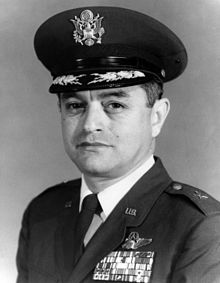Robert Cardenas
| Robert L. Cardenas | |
|---|---|
 |
|
| Nickname(s) | Bob |
| Born |
March 10, 1920 Mérida, Yucatán, Mexico |
| Allegiance |
|
| Service/branch |
|
| Years of service | 1939 - 1973 |
| Rank |
|
| Commands held | Vice commander, Sixteenth Air Force, 1969 USAF Special Operations Force, 1968 835th Air Division, 1966 18th Tactical Fighter Wing, 1964-66 51st Fighter Interceptor Wing, 1955-57 51st Fighter Interceptor Group, 1955-57 51st Maintenance & Supply Group, 1955-57 |
| Battles/wars |
World War II Vietnam War |
| Awards |
Air Force Distinguished Service Medal Legion of Merit, 1 OLC Distinguished Flying Cross Purple Heart Meritorious Service Medal Air Medal, 4 OLCs Joint Service Commendation Medal Air Force Commendation Medal, 1 OLC & Presidential Citation Spanish Grand Legion of Aeronautical Merit with Sash & Dagger |
| Other work | Executive |
Robert L. "Bob" Cardenas (born March 10, 1920) is a retired brigadier general of the United States Air Force.
He was born in Mérida, Yucatán, Mexico. When he was five, his family moved to San Diego, California. He excelled in mathematics and physics in high school. When Cardenas was a teenager, building models and learning about gliders first sparked his interest in airplanes.
Due to his excellent grades, San Diego State University invited him to enroll.
In 1939, while attending San Diego State, he decided to enlist as a private in the California National Guard. In 1940, Cardenas became an aviation cadet. He graduated, received his pilot wings and was commission a second lieutenant in the Army Air Corps in July 1941.
In 1942, Lt. Cardenas was sent to Twentynine Palms, California to help establish the Army Air Corps Glider School. He was assigned to Wright Field, Ohio and became a flight test officer. Cardenas rose quickly in position, was promoted to operations officer and finally director of the Flight Test Unit, Experimental Engineering Laboratory at Wright Field.
In 1944, he was assigned to the 506th Bombardment Squadron, 44th Bomb Group, also known the Flying Eightballs, based at Shipdham in Norfolk, England. He flew his first mission on the B-24 Liberator “Southern Comfort” on January 24.
On March 18, Captain Cardenas was flying as Command Pilot for the 44th Bomb Group on his 20th mission. His airplane, the B-24 “Sack Artists” (serial number 42-100073), was shot down by enemy anti-aircraft fire. His attack run was supposed to target the Manzell Air Armaments factory in Friedrichshafen, Germany. However, the right wing was severely damaged by a shell and two engines were set on fire. According to his report relayed to the War Department, his number 2 engine was "hit by flak [and] on fire," causing the loss of 3,000 ft. altitude. Despite this damage he "Rejoined formation for [a] second [bomb] run." After this pass his "[numbers] 2 and 4 [engines were] on fire," and "[number] 3 [was] vibrating badly" in addition to "gas leaks," damage to bomb bays, wings, and electrical systems, and "hydraulics inoperative." Several members of the crew were also wounded, including Cardenas, who received a head injury when a piece of flak pierced his helmet. Since the plane was severely damaged and losing stability, 1st Lieutenant Raymond J. Lacombe decided to pilot the plane to Switzerland. Cardenas' crew all parachuted safely. The bomber then exploded at a low altitude and sheared off the top of several trees.
...
Wikipedia
